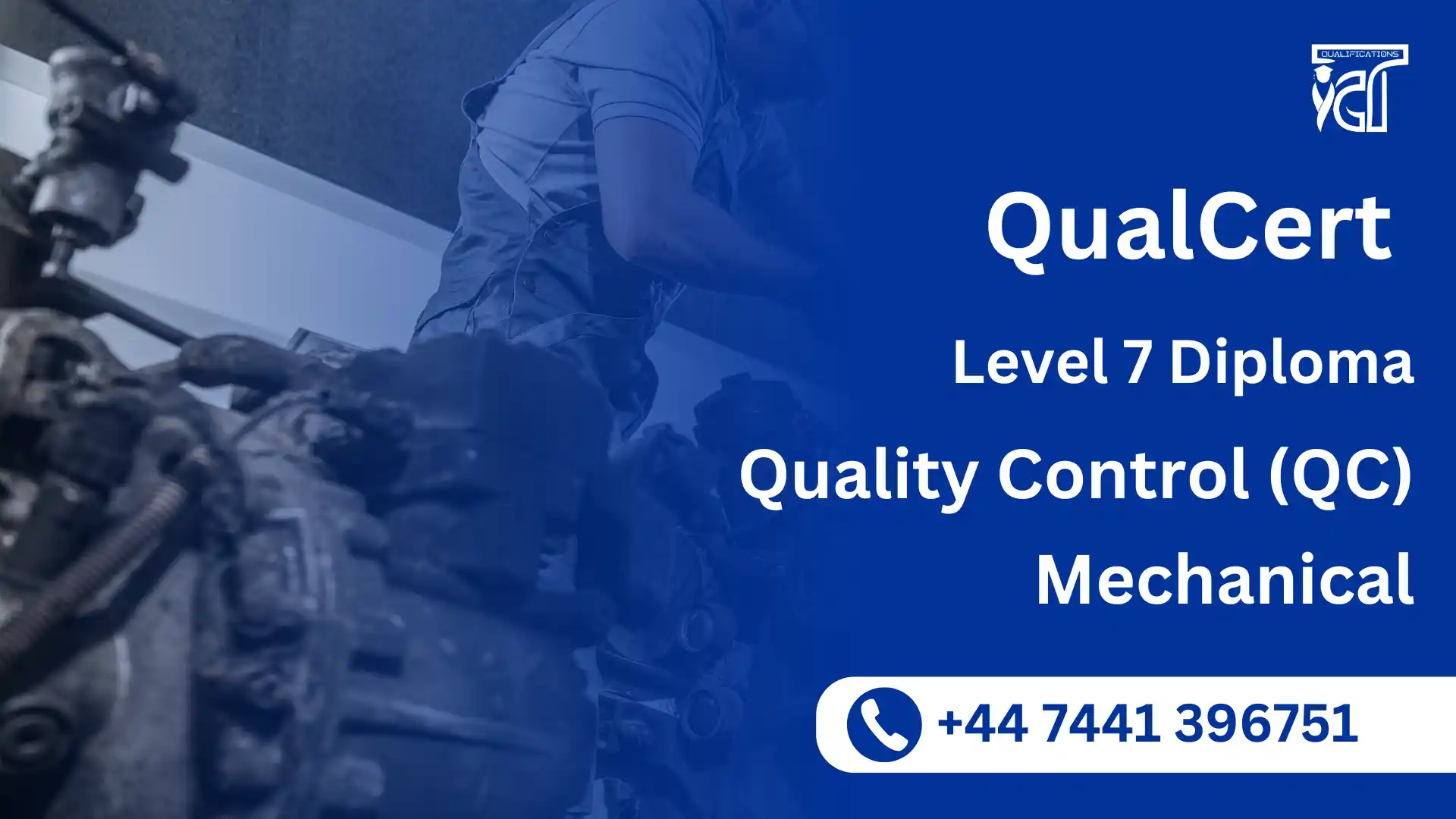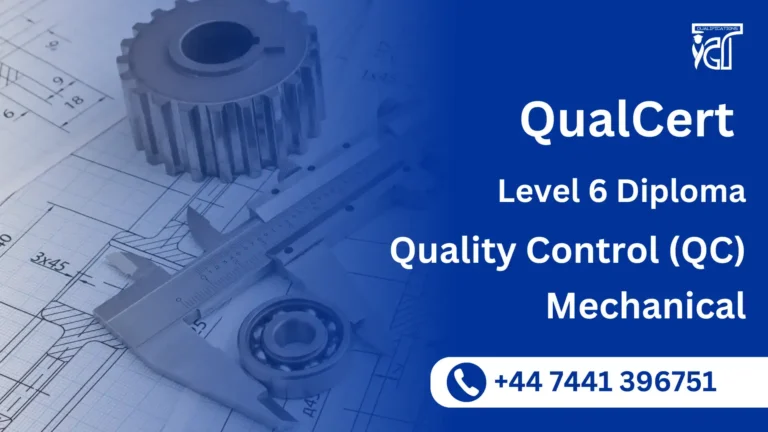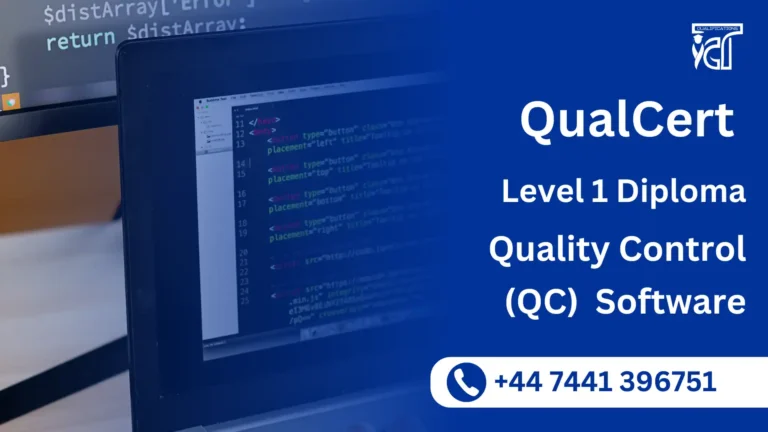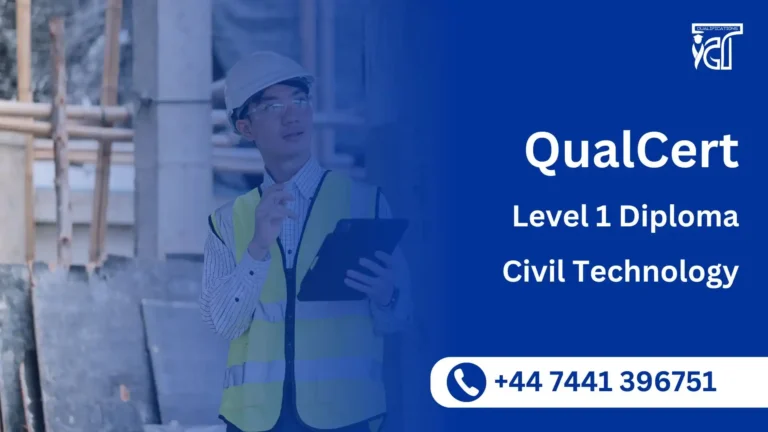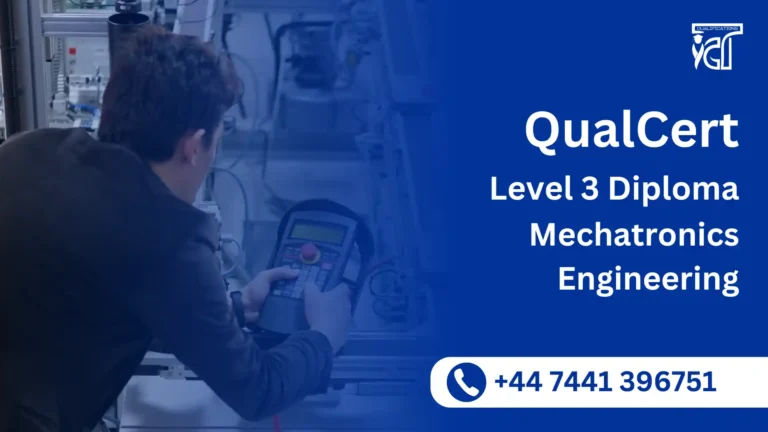The QualCert Level 7 Diploma in Quality Control (QC) Mechanical is a prestigious and advanced-level qualification designed to equip senior professionals and aspiring leaders with in-depth expertise in mechanical quality control systems. This program is tailored for those who aim to develop and implement robust quality assurance frameworks within mechanical engineering environments, ensuring the highest standards in production, testing, inspection, and regulatory compliance.
The course integrates theoretical principles with practical applications, focusing on advanced quality management strategies, auditing practices, mechanical systems evaluation, and the use of international QC standards. Participants will gain the knowledge and competencies needed to lead quality control teams, manage complex mechanical projects, and drive continuous improvement in quality performance.
Ideal for experienced engineers, quality assurance professionals, and technical managers, this diploma prepares learners for strategic roles in manufacturing, industrial operations, plant maintenance, and engineering consultancy sectors. By completing this program, graduates will not only elevate their professional standing but also contribute significantly to quality-driven operational excellence in the mechanical field.
QualCert Level 7 Diploma in Quality Control (QC) Mechanical
The QualCert Level 7 Diploma in Quality Control ( QC ) Mechanical comprises several study units designed to provide learners with a comprehensive understanding of QC principles and practices in the mechanical sector. Below is the qualification structure, including the Total Qualification Time (TQT) 1200, Guided Learning Hours (GLH) 600, and 120 Credits associated with the program.
| Unit Ref# | Unit Title | Credit | GLH | TQT |
| QC12013 – 1 | Mechanical Quality Control Leadership and Risk Management | 20 | 100 | 200 |
| QC12013 – 2 | Innovation, R&D, and Emerging Technologies in QC | 20 | 100 | 200 |
| QC12013 – 3 | Global Supply Chain and Quality Control Integration | 20 | 100 | 200 |
| QC12013 – 4 | Advanced Computational Methods for QC Decision-Making | 20 | 100 | 200 |
| QC12013 – 5 | Strategic Management of Mechanical Quality in Large-Scale Industries | 20 | 100 | 200 |
| QC12013 – 6 | Regulatory Frameworks and International Mechanical QC Certifications | 5 | 20 | 30 |
GLH (Guided Learning Hours) and TQT (Total Qualification Time) are terms commonly used in vocational qualifications to help define the amount of time a learner is expected to spend on their studies.
1. GLH (Guided Learning Hours)
GLH refers to the number of hours a learner spends being directly taught, supervised, or supported during their course. This includes the time spent in activities such as:
- Classroom instruction
- Practical workshops
- One-on-one tutoring or mentoring sessions
- Online learning sessions with tutor support
In other words, GLH represents the time that learners are actively engaged with their instructors or learning activities.
2. TQT (Total Qualification Time)
TQT represents the total amount of time a learner is expected to invest in completing a qualification, including:
- GLH (Guided Learning Hours): Time spent on direct learning, as explained above.
- Self-Directed Learning: This includes time spent on independent study, research, assignment completion, preparation for exams, and any other work the learner does outside of direct teaching hours.
TQT is a broader measure that includes all the time required to achieve the qualification. It helps learners and employers understand the overall commitment required for the qualification.
Key Differences Between GLH and TQT:
- GLH focuses on direct learning with guidance or supervision.
- TQT includes GLH as well as independent study time and other learning-related activities.
Example:
If a qualification has a TQT of 600 hours and a GLH of 250 hours, it means the learner should spend 250 hours in direct learning (classroom, online, or tutor-led sessions) and 350 hours on independent study or research.
Mechanical Quality Control Leadership and Risk Management
- Develop leadership strategies to drive quality excellence in mechanical engineering.
- Assess and mitigate risks associated with mechanical quality control processes.
- Implement effective quality management frameworks to enhance operational efficiency.
- Foster a culture of continuous improvement and compliance in mechanical QC.
Innovation, R&D, and Emerging Technologies in QC
- Analyze the impact of emerging technologies on quality control in mechanical engineering.
- Develop research-driven solutions for quality improvement and defect prevention.
- Apply innovative methodologies to enhance mechanical QC processes.
- Assess the role of R&D in advancing mechanical quality assurance standards.
Global Supply Chain and Quality Control Integration
- Evaluate the impact of global supply chain dynamics on mechanical quality control.
- Implement quality assurance strategies across international manufacturing networks.
- Develop risk management plans to address supply chain disruptions affecting QC.
- Ensure compliance with international trade and quality certification requirements.
Advanced Computational Methods for QC Decision-Making
- Apply advanced computational models to optimize quality control processes.
- Utilize data-driven decision-making techniques for defect detection and process improvement.
- Implement AI and machine learning algorithms for predictive quality analysis.
- Assess the effectiveness of digital tools in enhancing mechanical QC accuracy.
Strategic Management of Mechanical Quality in Large-Scale Industries
- Develop strategic quality management plans for large-scale mechanical manufacturing.
- Implement quality control frameworks to ensure consistency and compliance.
- Assess the role of quality management in improving operational efficiency and cost-effectiveness.
- Lead cross-functional teams to drive quality excellence in large industrial settings.
Regulatory Frameworks and International Mechanical QC Certifications
- Interpret and apply international regulatory standards for mechanical quality control.
- Ensure compliance with ISO and industry-specific QC certification requirements.
- Develop audit and inspection strategies to maintain regulatory compliance.
- Assess the impact of global quality standards on mechanical manufacturing processes.
Course Benefits: QualCert Level 1 Diploma in Quality Control (QC) Software
The QualCert Level 7 Diploma in Quality Control (QC) Mechanical offers a wide range of professional and academic benefits, making it an ideal choice for individuals aiming to excel in senior quality control roles within the mechanical engineering industry. Below are the key advantages of this program:
- Advanced Industry Knowledge
Gain a comprehensive understanding of advanced mechanical quality control systems, methodologies, and international standards used across global industries. - Leadership & Strategic Skills
Develop the leadership and managerial capabilities necessary to oversee large-scale QC operations, lead audit teams, and implement continuous improvement processes. - Practical Application
Apply quality control concepts to real-world mechanical systems, including inspection, testing, risk assessment, and quality assurance audits. - Enhanced Career Prospects
Qualify for high-level positions such as Senior Quality Engineer, QC Manager, Mechanical Inspector, or Compliance Officer in manufacturing, energy, automotive, and construction sectors. - Global Recognition
Obtain an internationally respected qualification that enhances your credibility and employability in both local and international job markets. - Improved Regulatory Compliance
Learn how to ensure full compliance with industry regulations and standards such as ISO, ASME, and API, reducing operational risk and increasing efficiency. - Pathway to Further Study
Serves as a strong foundation for progression to higher qualifications such as a master’s degree or specialized certification in quality management or mechanical engineering. - Boost in Professional Confidence
Enhance your decision-making, problem-solving, and analytical skills, enabling you to make informed judgments in complex mechanical QC environments. - Network Building Opportunities
Engage with industry experts, peers, and mentors, creating valuable connections that can support your professional growth and collaboration. - Flexibility for Working Professionals
The course is designed with flexibility in mind, making it suitable for individuals already working in the industry who wish to upskill without interrupting their careers.
This diploma not only strengthens technical and managerial skills but also empowers professionals to lead quality transformation in modern mechanical engineering sectors.
Ideal Learner for QualCert Level 7 Diploma in Quality Control (QC) Mechanical
The ideal learner for the QualCert Level 7 Diploma in Quality Control (QC) Mechanical is an experienced professional seeking to deepen their expertise and take on senior roles in quality control within the mechanical engineering sector. This program is particularly suited for:
- Experienced Quality Control Professionals
Individuals already working in QC roles who want to advance their careers by acquiring strategic and high-level technical skills. - Mechanical Engineers
Professionals with a background in mechanical engineering who aim to specialize in quality control systems, inspection, and regulatory compliance. - Quality Managers and Supervisors
Those in leadership positions looking to formalize their knowledge with an advanced diploma and gain deeper insights into modern QC practices and methodologies. - Technical Auditors and Inspectors
Individuals responsible for evaluating systems, procedures, and products, who require advanced training in mechanical quality assurance and auditing. - Manufacturing & Industrial Professionals
Employees working in production, fabrication, plant maintenance, or process engineering who want to improve the quality and reliability of mechanical systems. - Consultants and Trainers
Professionals involved in advising or training others in quality systems who need a recognized qualification to support their expertise. - Aspiring Senior Leaders
Candidates with mid-level experience aiming for strategic roles such as Quality Director, Senior QC Engineer, or Technical Operations Manager.
This diploma is best suited for individuals who possess analytical thinking, problem-solving skills, attention to detail, and a strong interest in mechanical systems and quality excellence. It is ideal for those committed to professional development and continuous improvement in high-performance engineering environments.
Entry Requirements
Entry Requirements: QualCert Level 7 Diploma in Quality Control (QC) Mechanical
To ensure that learners can successfully engage with the advanced content of the QualCert Level 7 Diploma in Quality Control (QC) Mechanical, the following entry requirements must be met:
- Age Requirement:
- Learners must be 21 years or older at the time of enrollment.
- Educational Background:
- A Level 6 qualification (such as a bachelor’s degree or equivalent) in mechanical engineering, industrial technology, quality management, or a related field is preferred.
- Alternatively, applicants with a Level 5 diploma and substantial industry experience may also be considered.
- Work Experience:
- A minimum of 3 years of relevant work experience in mechanical engineering, quality control, quality assurance, or related technical roles is highly recommended.
- This ensures learners can contextualize theoretical knowledge in practical settings.
- English Language Proficiency:
- For non-native English speakers, a reasonable level of proficiency is required. This can be demonstrated through:
- IELTS score of 5.5 or above, or
- Equivalent recognized English language qualification, or
- Proof of prior education or professional experience in an English-speaking environment.
- For non-native English speakers, a reasonable level of proficiency is required. This can be demonstrated through:
- Technical Understanding:
- Learners should have a strong understanding of mechanical systems, inspection techniques, and quality control principles.
Applicants who do not meet the formal education criteria but have significant industry experience and demonstrated capabilities may be accepted through Recognition of Prior Learning (RPL) or a detailed professional portfolio review.
Register Now
Qualification Process
Qualification Process for the QualCert Level 7 Diploma in Quality Control (QC) Mechanical
- Self-Assessment:
Begin by evaluating your eligibility to ensure you meet the qualification requirements, including work experience, knowledge, and language proficiency. - Registration:
Complete your registration by submitting the required documents, including a scanned copy of a valid ID, and paying the registration fee. - Induction:
An assessor will conduct an induction to confirm your eligibility for the course and explain the evidence requirements. If you do not meet the criteria, your registration will be canceled, and the fee will be refunded. - Assignmnets & Evidence Submission:
Provide all assignmnets and the necessary evidence based on the assessment criteria outlined in the course. If you are unsure of the required evidence, consult with the assessor for guidance on the type and nature of evidence needed. - Feedback and Revision:
The assessor will review your submitted evidence and provide feedback. Evidence that meets the criteria will be marked as “Criteria Met,” while any gaps will be identified. You will be asked to revise and resubmit if needed. - Competence Evidence:
Submit final evidence demonstrating that all learning outcomes have been met. This evidence will be marked as “Criteria Met” by the assessor once it is satisfactory. - Internal Quality Assurance (IQA):
The Internal Quality Assurance Verifier (IQA) will review your evidence to ensure consistency, quality, and compliance with standards. - External Verification:
The IQA will submit your portfolio to QualCert External Quality Assurance Verifiers (EQA) for final confirmation. The EQA may contact you directly to verify the authenticity of your evidence. - Certification:
Upon successful completion of all checks, QualCert will issue your official certificate, confirming that you have attained the QualCert Level 7 Diploma in Quality Control (QC) Mechanical.

